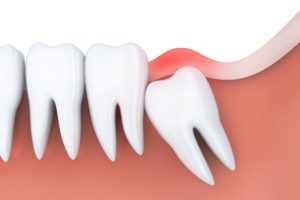 The average adult has 32 teeth, with each tooth serving a specific purpose. The incisors in the front of your mouth tear food into small pieces to make them easier to chew. Your molars grind the food to make it small enough to swallow. Adults have 3 sets of molars on the top and bottom; however, the third set doesn’t appear until the late teen years. Wisdom teeth erupt between the ages of 17 and 21, but many people need to have them removed. 5 million people annually have them extracted. With so many extractions each year, why do we even have wisdom teeth? Believe it or not, they once served an important purpose, but nowadays they are more of a nuisance, and here’s why.
The average adult has 32 teeth, with each tooth serving a specific purpose. The incisors in the front of your mouth tear food into small pieces to make them easier to chew. Your molars grind the food to make it small enough to swallow. Adults have 3 sets of molars on the top and bottom; however, the third set doesn’t appear until the late teen years. Wisdom teeth erupt between the ages of 17 and 21, but many people need to have them removed. 5 million people annually have them extracted. With so many extractions each year, why do we even have wisdom teeth? Believe it or not, they once served an important purpose, but nowadays they are more of a nuisance, and here’s why.
Evolution of Wisdom Teeth
Humans grew wisdom teeth to enhance our chewing power, which was necessary for hunters and gatherers to maintain a nourishing diet. They needed a broader jaw to grind and chew their food. However, with the development of forks, knives, and cooking meats, food has become easier to chew, which may have caused human jaws to become narrower throughout time. As a result, there’s often not enough room to accommodate another set of molars.
Besides smaller jaws, many people don’t get wisdom teeth, leading researchers to believe they may disappear altogether, eventually. According to one study, 53% of people over the age of 25 had at least one wisdom tooth erupt, with men more likely to have them than women. Just because you may not see any wisdom teeth from the surface, that doesn’t mean they aren’t there. According to the American Academy of Oral and Maxillofacial Surgeons, 90% of people have at least one impacted wisdom tooth, which is the leading cause of extractions.
When is Wisdom Tooth Extraction Necessary?
As wisdom teeth continue to serve less of a purpose, the number of issues associated with the third molars has increased. Your dentist may recommend having them removed to prevent or treat several problems, like:
- Infections: Wisdom teeth can be difficult to keep clean because they are so far back in the mouth. Not to mention, many are partially or fully impacted, which increases the risk of infections.
- Impactions: Many wisdom teeth can’t erupt correctly because there’s not enough room in the mouth. If a tooth isn’t completely above the gum tissue, you will likely need to have it removed.
- Orthodontics: Wisdom teeth can cause overcrowding. Removing them will create more space to fix bite and alignment issues.
If your wisdom teeth are causing pain, inflammation, or infections, it might be time to have them removed. Schedule a wisdom teeth removal consultation to get the relief you need.
About Dr. Keyvan Kar
Dr. Kar earned his dental degree from the University of the Cologne School of Dentistry and has completed continuing education to become certified in prosthodontics. He regularly pursues continuing education to treat the most complex oral health issues. If you need to have your wisdom teeth removed, contact our office today to schedule your consultation.
